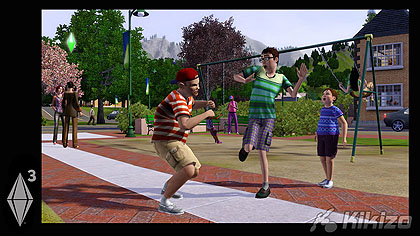The Sims 3: EA Maxis' Ben Bell Interview
Huge interview with the executive producer of The Sims 3 at EA Maxis, Ben Bell.
Page 2
Kikizo: Can you give us any specific examples of the complexity of those AI relationships?
Bell: Yeah, let's say love the Sopranos and you want to put Tony Soprano in the game, see what it would be like to live alongside Tony Soprano. You can put him in the game, make him "Mean-Spirited", make him evil, give him the "Kleptomaniac" trait, and then you can see what his life is like - give him the "Criminal" career. He'll come over to your house, yell at you, threaten you, because he has the Mean-Spirited trait, if you're not looking he's going to snatch your stuff... so you get to see what life is like living next to a homicidal criminal.
Kikizo: I assume you want to keep your focus on the family-friendly stuff, and not actually let the player put a murderer into the game. Though that would be rather cool...
Bell: The game is for families in that it's a non-violent game, but players can make any character they want and there are lot of very clever things that you can make happen. So it's really open-ended, it's up to you what kind of characters you put in the town. It's not really possible to do cruel or mean things - that's not the kind of game we are - but the characters and the personalities can definitely be a part of your game.
Kikizo: What stage are you at in development?
Bell: Pre-alpha, we're months away from finishing the game.
Kikizo: How important are graphics to a game like this? I have relatives who are still mad on one of the first game's expansions, which is obviously a pretty long way from cutting edge tech-wise...
Bell: I think when it comes to customisation, graphics mean a ton. People really want to tell their story, or make it personal - the game becomes so much more meaningful when it's personal - but in terms of the actual gameplay, I think the graphics are nice but I really feel like this is a game that encourages imagination.
It's a bit like reading a novel - where you start to imagine the things that are happening between the words and images. And that's really what happens with The Sims - it's definitely a strategy game where you can get ahead in life and earn money to buy cool things, but at the same time you're really being imaginative.
A lot of games don't really afford your mind room for that imagination, but this is a game that gives you a lot of space. Because you have all of these real-life events, but you can do whatever you want with them. So you'll find that when people talk about their characters, sometimes they'll talk about them in third person, sometimes they'll talk about them in first person - they'll switch point of view like an author would. It's really interesting.
Kikizo: Have you drawn on any particular writers or precedents outside videogames in creating that experience, different ways of putting together a narrative and so forth?
Bell: We really studied psychology - we also studied pop psychology, so for example when we designed all the more personality traits, we actually went out and looked at personal ads for inspiration. So it goes all ways - we have the more intellectual approach, but we also look at society and pop culture, all those different influences as well.








 Satoru Iwata Video Interview - the late Nintendo president spoke with Kikizo in 2004 as 'Nintendo Revolution' loomed.
Satoru Iwata Video Interview - the late Nintendo president spoke with Kikizo in 2004 as 'Nintendo Revolution' loomed. Kaz Hirai Video Interview - the first of Kikizo's interviews with the man who went on to become global head of Sony.
Kaz Hirai Video Interview - the first of Kikizo's interviews with the man who went on to become global head of Sony. Ed Fries Video Interview - one of Xbox's founders discusses an epic journey from Excel to Xbox.
Ed Fries Video Interview - one of Xbox's founders discusses an epic journey from Excel to Xbox. Yu Suzuki, the Kikizo Interview - we spend time with one of gaming's most revered creators.
Yu Suzuki, the Kikizo Interview - we spend time with one of gaming's most revered creators. Tetris - The Making of an Icon: Alexey Pajitnov and Henk Rogers reveal the fascinating story behind Tetris
Tetris - The Making of an Icon: Alexey Pajitnov and Henk Rogers reveal the fascinating story behind Tetris Rare founders, Chris and Tim Stamper - their only interview? Genuinely 'rare' sit down with founders of the legendary studio.
Rare founders, Chris and Tim Stamper - their only interview? Genuinely 'rare' sit down with founders of the legendary studio. The History of First-Person Shooters - a retrospective, from Maze War to Modern Warfare
The History of First-Person Shooters - a retrospective, from Maze War to Modern Warfare